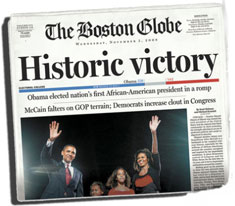Righting the Racial Past
We might be in a post-civil rights era now, but America is hardly post-racial, say two professors
By Helene Ragovin
The headlines after Barack Obama was elected president said it all: historic victory. But in fact, says Tufts political scientist Natalie Masuoka, Obama’s entire campaign was emblematic of a major shift that already had occurred: the way many Americans relate to the subject of race. It was a shift that largely went unnoticed by most political commentators and writers, who were viewing the 2008 election through an outdated lens.

“I think what Barack Obama’s campaign demonstrated is that we are indeed in a different racial context today,” says Natalie Masuoka, an assistant professor of political science in her first year at Tufts. Photo: Alonso Nichols
People assume “that what we know about racial attitudes is based on a racial environment before the 1960s era,” she says. “They’re thinking of the Deep South, of African Americans being beaten by police, of segregation, of busing, when they think of racial issues.”
But the environment today is much more complex. “The political context is not defined by what is seen as a pre-civil rights era race relations environment,” Masuoka says. “I think what Barack Obama’s campaign demonstrated is that we are indeed in a different racial context today.”
Obama’s victory does not mean it’s time for Americans to stop talking about race, but it does change the conversation. “It would be a mistake to think that this election solves everything or proves that racial bias is no longer a concern,” says the Tufts social psychologist Sam Sommers, who studies how race and gender affect perception, decision-making and behavior.
That said, has the nature of the dialogue about race changed in our society? “To some extent, yes, it has to,” Sommers says.
Multicultural America
For her part, Masuoka’s research looks at the political behavior of biracial and mixed-race Americans, exemplified most notably by Obama himself.
“I think it’s interesting that Barack Obama chose to frame his story as a story of multicultural America,” Masuoka says. “He didn’t necessarily sell himself as a prototypical African-American, civil-rights candidate, like Jesse Jackson or Al Sharpton. He didn’t have what we have known as the classic African-American campaign message of talking about race relations, of fighting racial injustice, of talking about racial discrimination.”
Instead, she says, Obama directed his message toward an audience with a post-civil rights sensibility, one that, for the most part, had not grown up with Jim Crow or explicit segregation and wasn’t necessarily expecting to hear racially driven rhetoric.
Americans of all races who came of age during the last 30 or 40 years have experienced a more integrated, multicultural society that frames the way they interact with each other, Masuoka says. Obama’s message “was about thinking about the future and how race relations have changed in the U.S., which is not what we have seen in past campaigns.” That message, she says, particularly resonated with younger voters, who supported Obama in great numbers.

“I’m not convinced, by any means, that in the future, a black candidate has as much chance as a white candidate in any race in any election,” says Sam Sommers, an assistant professor of psychology. Photo: Zara Tzanev
Playing the Race Card
“To me, when it comes to this election, one of the most interesting aspects of it was how obviously at one level, it was all about race,” says Sommers. “But when you really think about it, it was never about race explicitly.”
Sommers wrote about race and the presidential campaign throughout the summer and fall on his blog, Science of Small Talk, which appears on the website of Psychology Today magazine.
“I think it was something the Obama camp consciously decided not to make a major part of their campaign, and they very rarely, if ever, talked about it, with the exception of the race speech on March 18 in Philadelphia,” Sommers says. “At times it seemed like the McCain campaign was more interested in bringing the subject up, by talking about ‘playing the race card,’ for example.”
Discussion of a “post-civil rights” era should not be confused with a “post-racial” era—America is far from the point where race is immaterial, Masuoka says.
“It’s very interesting that journalists and pundits talk about America being ‘post-racial,’ and then they talk about how it’s a big deal that Barack Obama will be the first African-American president,” she says. “It’s still about race if we’re talking about racial identity.”
Sommers agrees. “I think you’ll get a substantial portion of the country that says, ‘We don’t have to talk about race anymore,’ ” he says. “I don’t think one-time events, or singular events, are ever a proven basis for that conclusion.
“An interesting question for psychologists is, ‘Where does society go from here?’ ” Sommers notes. “When schoolchildren see those 44 presidents’ faces across the bulletin board, and the last one is a person of color, that does change things in terms of what you think of as being possible and how you see the world.”

“What does it mean when we talk about being in a post-racial society?” Masuoka asks. “Does it mean race doesn’t matter? Or the other scenario is that it means race can’t be used as a political strategy anymore to mobilize different populations in the U.S. I’ve heard it used in that context, too.”
Masuoka believes neither scenario holds up. In the case of political strategies, both the Democrats and Republicans were “explicitly racial,” she says. “Talking about the Latino vote, and the Asian vote, and the black vote, and the rise of consultants who are microtargeters, and identifying certain preferences and certain mobilization strategies for different ethnic populations in the U.S. does make race an issue in terms of campaign strategies.”
The 2008 presidential election cannot be thought about in a vacuum. There were other factors at work, most prominently an unpopular sitting president and economic calamity of unprecedented proportions, Sommers adds. “I’m not convinced by any means that in the future, a black candidate has as much chance as a white candidate in any race in any election.”
Helene Ragovin can be reached at helene.ragovin@tufts.edu.


